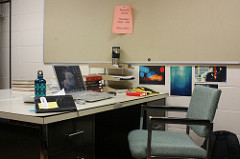Managing Communication Channels
By Mary Bigelow
Posted on 2016-07-11
 Last year, I tried improving my communications with students and parents via electronic media. I had lots of responses, but I was being texted, tweeted, emailed, and called on the phone at all times of the day and night. While I want to encourage these communications, I’m looking for ideas to manage them and keep my sanity! —G., Colorado
Last year, I tried improving my communications with students and parents via electronic media. I had lots of responses, but I was being texted, tweeted, emailed, and called on the phone at all times of the day and night. While I want to encourage these communications, I’m looking for ideas to manage them and keep my sanity! —G., Colorado
It sounds like you have a case of “be careful what you wish for….” Many teachers would love to have parents and students contacting them, but I can understand how this can become overwhelming.
In a recent article in Educational Leadership (May 2016)*, Catlin Tucker, an English teacher from California, shared her ideas on “avoiding technology overload.” You may find them helpful as you try to manage communications with the many other responsibilities of a science teacher:
- Establish virtual office hours. Just as college professors publish office hours in a course syllabus, let student and parents know when you can be contacted in real time outside of class and when you’ll be able to respond to messages they leave regarding class topics and issues. Post these times on the class website and your online class calendar.
- Choose one communication channel. I hadn’t thought about this, but the author suggests that having a preferred medium helps you be more focused without switching between texting, tweeting, emailing, and traditional phone calls. The author settled on email for non-urgent questions and texting for more immediate needs. Both of these also give you some time to think about the questions or issues before responding. (But if many of your parents do not have email, you still may have to rely on phone calls.)
- Make information available online. Use a class blog, webpage or other online methods to post information and a calendar. Update it frequently with assignments, videos, the syllabus, handouts, rubrics, extra readings, class schedules, and multimedia resources. Include your syllabus and safety acknowledgment form, too. Encourage students to refer to the calendar to try to avoid the “Are we having a test tomorrow?” or “Did I miss anything when I was absent?” type of questions. This means that you will have to update the site on a weekly or daily basis.
- Set up a space where students can connect online. Students often will answer each other’s questions or offer advice. The author suggests having a private community site or forum you can monitor and participate in. You can get feedback on what students find interesting or concerning about your class.
- Protect unplugged time at home. Your personal time is valuable. Teachers need a break to take care of their families, prepare lessons, go to graduate classes, participate in community programs, or have a little “me” time for exercise or relaxation. Let students and parents know when you’ll be online and when you’ll be offline. You should also consider how available you want to be on weekends or holiday breaks.
I would add another suggestion: Protect your class time. I was visiting a classroom where the teacher’s phone rang several times and she received several text messages. She attended to these distractions, which interrupted the lesson. Let parents know that during the day, your phone will be off (or muted) to incoming messages out of respect to your students and the learning process. You will not be able to respond to a message until a planning period, after school, or during your stated office hours. This is especially critical for science teachers supervising students in a laboratory situation. They must have your undivided attention.
One downside of communications technology is the perception that we are “on call” 24/7. You’re wise to consider how to make these communications an efficient and effective asset.
—–
*Five Tips for Avoiding Technology Overload
Photo: https://farm2.staticflickr.com/1181/3172841858_4f317b12f7_m_d.jpg
Disclaimer: The views expressed in this blog post are those of the author(s) and do not necessarily reflect the official position of the National Science Teaching Association (NSTA).

